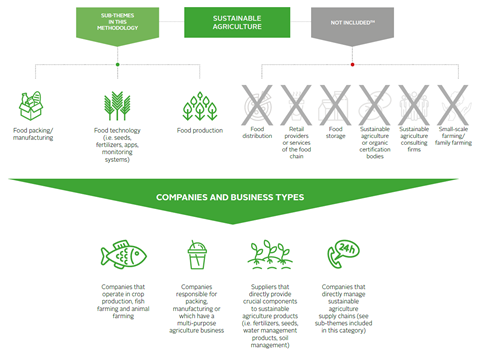
Sustainable agriculture as a thematic investment is relatively new in the impact investing industry; but while few companies currently work or invest in this area, it is a growing market. Indeed, the global market value of sustainable agriculture products (including ethically-labelled packaged food) is projected to grow from US$793.3 billion in 2015 to US$872.7 billion by 2020.
Sustainable agriculture generally focuses on products, services and practices that ensure the protection of local economic, social and natural interests. Companies may adopt a variety of certifications and practices to align their agribusinesses with sustainable standards and country regulations. However, since this is a relatively new thematic investment, there is still an array of definitions of sustainable agriculture, and countries define standards and sustainable agriculture practices differently.
“The Market Map will go a long way towards achieving a new level of clarity, allowing investors to consistently evaluate whether a company falls within a range that is acceptable in terms of their strategy, as well as assess performance across a portfolio”.
Hannah Young, for UFF African Agri Investments
For example, some countries adopt policies to align sustainable agriculture with organic practices. In other countries, sustainable agriculture is not necessarily linked to organic farming or practices. In fact, sustainable agriculture certifications do not differentiate certain agriculture inputs, such as seed types (organic, hybrid or genetically modified organisms – GMO) and focus instead on farming processes, land use and community, and ecosystems involved in the agriculture businesses. As such, organic farming is not necessarily related to sustainable farming.
Since the concept of sustainable agriculture is broad, it allows organisations to tailor their investments in this area. For example, some companies may invest in farmers’ quality of life (human rights), but not in water or soil management. As a result, business benchmarking is difficult to develop in this field.
Overall, the market relies on third-party or national certifications to ensure that companies are operating in a sustainable agriculture market. But there are many different types of certification in this industry, including over 20 types of sustainable agriculture certifications.

Some certifications are designed for different types of companies, processes, sustainable targets and sustainable practices, such as the Protected Harvest certification, which covers farmers, buyers and customers. As a result, the focus and scope of certifications may differ drastically, making it more difficult for investors and companies to compare sustainable agriculture businesses.
Based on these challenges, the PRI reviewed several reports and studies from international organisations and found significant symmetry among UN conventions and international organisations. The Food and Agriculture Organisation (FAO) and other UN bodies have clear principles and approaches to define sustainable agriculture and provide direction to design criteria for this theme.
Definition: Sustainable agriculture
Sustainable agriculture conserves land, water, and plant and animal genetic resources, and is environmentally non-degrading, technically appropriate, economically viable and socially acceptable.
FAO
Download the full report
-

Impact investing market map
August 2018
Impact investing market map
- 1
- 2
- 3
- 4
- 5
- 6
 Currently reading
Currently readingSustainable agriculture
- 7
- 8
- 9
- 10
- 11
- 12



















